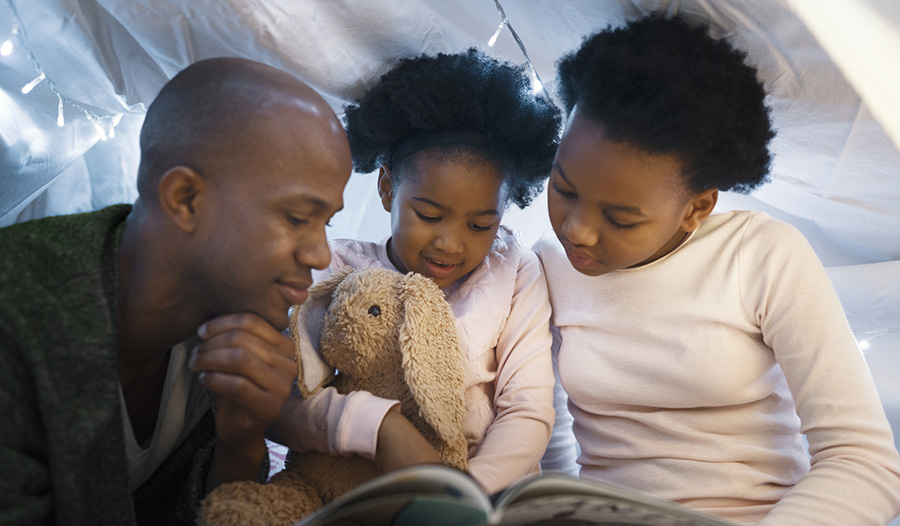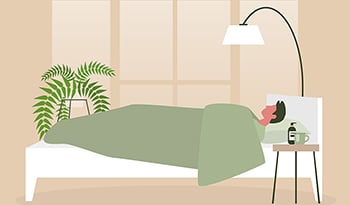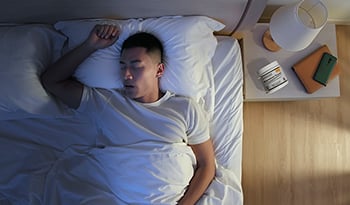Healthy Nighttime Ritual for Kids

Help! My child isn’t sleeping!
Often, parents will visit my office and ask about nighttime rituals prior to putting their child or children to sleep. I frequently am asked about teeth brushing, story reading, baths versus showers, and skin care.
Here are the most important factors when it comes to establishing an effective bedtime routine.
Consistency Is Key
Every child is unique, so different bedtime rituals may work better for some than others. No matter what routine you establish, I always suggest consistency. Consistency is important because it allows children to know what is coming next and helps them unwind after what was likely a busy day!
Brush, Book, Bed
The American Academy of Pediatrics (AAP) has three recommendations for how to structure your child’s nighttime routine and these include:
- Helping your child brush his or her teeth.
- Reading a favorite book (or two).
- Getting to bed at a regular time each night.
Healthy Sleep Habits Are Important for Children
Creating an optimal sleep environment is also important. A cool, quiet and dark space is best to encourage sleeping. Limiting screen time is another important consideration. Turning off screens at least 30 minutes before bedtime is recommended. Televisions, computers and other screens are best left outside of the child’s room, so that they don’t become a distraction or interfere with sleeping.
Be sure to limit toys in the bed, too, so that your child isn’t tempted to play instead of sleep. One or two things – a security blanket or stuffed animal – can help ease anxiety and allow children to self-soothe.
Consider Melatonin for Short-term Sleeping Difficulties
Some children have difficulty sleeping at nighttime, whether from anxiety or feeling too much energy leftover from earlier in the day. Some children may be restless at night, especially if they are traveling or in a new environment. Vacation or visiting family in a foreign place may lead to increased stress and decrease the likelihood of a good night’s sleep. In these situations or if a family finds that a child is struggling to sleep at home, I recommend adding melatonin to the bedtime routine.
What is Melatonin?
Melatonin is a natural substance produced by a region in the brain called the pineal gland. It is released naturally at nighttime and helps the body relax in preparation for bedtime. It is important to note that it is available over the counter, and not by prescription. It is not appropriate for daily, long-term use and initiating melatonin should always be discussed with your pediatrician first. Also, it should never replace healthy sleep habits, such as the three mentioned above.
This supplement is a short-term solution to allow children to get rest while establishing a good bedtime routine if one is not already in place. It may also allow older children to re-establish a healthy sleep schedule if it has been disrupted by traveling or vacation.
What Dose of Melatonin is Recommended for my Child?
Starting with the lowest dose is recommended and working with your pediatrician when choosing the product and the formulation is important. Melatonin is available in liquid, gummies, chewable tablets and capsules – all with varying doses – so be sure to discuss the appropriate dose and formulation prior to initiating this at nighttime. Many children respond to the lowest dosage of melatonin when it is given 30-60 minutes prior to bedtime.
Consider Aromatherapy for Bath Time
Most children take a bath or shower in the evening as part of their bedtime routine. Implementing aromatherapy during this time is a great way to help children relax during this portion of the bedtime routine and calm their senses, priming them to be able to fall asleep after getting into bed. Adding one to two drops of lavender oil to the bath water will help calm your child - and another great benefit is that it can help soothe irritated skin. Chamomile and vanilla are two additional calming fragrances that you can add to your child’s bath.
For nights that you may skip the bath, but still want to benefit from the soothing effects of lavender, consider mixing a few drops of lavender oil in a spray bottle with one cup of water and spritzing the pillow and sheets.
After the Bath, Try Soothing Lotion
After bath, you can continue to encourage calmness by using a soothing lotion on the skin. This will also help to maintain moisture and avoid dryness. Many lotions are available in calming scents, such as lavender, coconut or vanilla. Massaging the skin when moisturizing can also help your child relax after the bath and prepare for bedtime.
Make Sure Your Child Is Getting the Right Amount of Sleep
Another important factor to keep in mind is how much sleep is recommended for your child based on age and remembering this when choosing an appropriate bedtime. Here is how much the AAP recommends children sleep, based on age:
- 4 months to 1 year: 12-16 hours of sleep per day (including naps)
- 1-2 years old: 11-14 hours of sleep per day (including naps)
- 3-5 years old: 10-13 hours of sleep per day, (including naps, if they are still napping)
- 6-12 years old: 9-12 hours of sleep per day
- 13-18 years old: 8-10 hours of sleep per day
Getting enough sleep encourages overall health and wellness and is associated with improved attention, learning, behavior, emotional regulation and quality of life.
Remember, consistency is key when you are deciding on a bedtime ritual for your child. Be sure to encourage a routine so that your child is comfortable and knows what to expect at bedtime. This will allow them to fully unwind and fall asleep.
Be sure to also involve your pediatrician in bedtime ritual conversations, especially if your child seems to be having difficulty sleeping through the night. He or she may be able to recommend specific sleep hygiene habits that may encourage a better night’s sleep for your child or children, which will hopefully also allow you to catch some more zzzs!
References:
- https://www.healthychildren.org/English/healthy-living/oral-health/Pages/Brush-Book-Bed.aspx
- https://www.aap.org/en-us/about-the-aap/aap-press-room/Pages/American-Academy-of-Pediatrics-Supports-Childhood-Sleep-Guidelines.aspx
DISCLAIMER:This Wellness Hub does not intend to provide diagnosis...
















































































 Table of Contents
Table of Contents
















